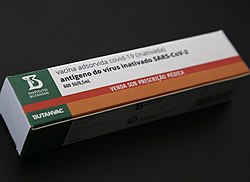 Packaging for the Brazilian version of NDV-HXP-S, ButanVac | |
| Vaccine description | |
|---|---|
| Target | SARS-CoV-2 |
| Vaccine type | viral vector or inactivated |
| Clinical data | |
| Trade names | ButanVac (Brazil) COVIVAC (Vietnam) HXP-GPOVac (Thailand) Patria (Mexico) |
| Other names | ADAPTCOV |
| Routes of administration | Intramuscular, [1] Intranasal |
| Part of a series on the |
| COVID-19 pandemic |
|---|
 |
|
| |
NDV-HXP-S (known as ButanVac [2] [3] or ADAPTCOV [4] in Brazil, COVIVAC [5] in Vietnam, HXP-GPOVac [6] in Thailand, Patria [7] in Mexico) is a COVID-19 vaccine candidate developed under the leadership of Peter Palese, Adolfo García-Sastre, and Florian Krammer at the Icahn School of Medicine at Mount Sinai, in New York, United States. [8] [9]
Contents
The name NDV-HXP-S comes from the terms Newcastle disease virus, HexaPro, and spike protein. [8] The stabilization of the S protein of SARS-CoV-2 (HexaPro) was achieved by Jason McLellan from the University of Texas at Austin. [10]
